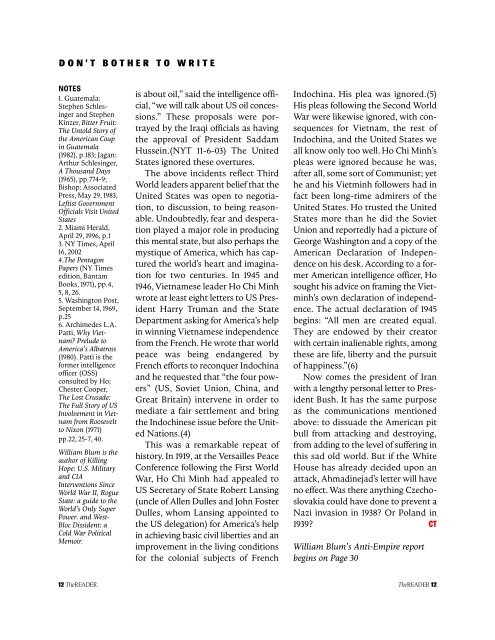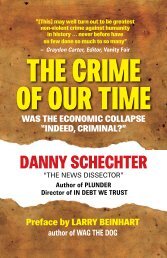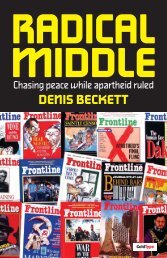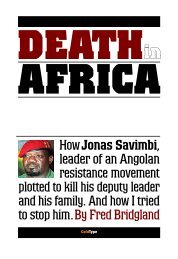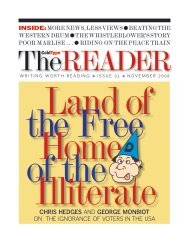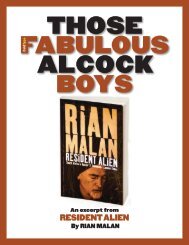Inside - ColdType
Inside - ColdType
Inside - ColdType
Create successful ePaper yourself
Turn your PDF publications into a flip-book with our unique Google optimized e-Paper software.
DON’T BOTHER TO WRITE<br />
NOTES<br />
1. Guatemala:<br />
Stephen Schlesinger<br />
and Stephen<br />
Kinzer, Bitter Fruit:<br />
The Untold Story of<br />
the American Coup<br />
in Guatemala<br />
(1982), p.183; Jagan:<br />
Arthur Schlesinger,<br />
A Thousand Days<br />
(1965), pp.774-9;<br />
Bishop: Associated<br />
Press, May 29, 1983,<br />
Leftist Government<br />
Officials Visit United<br />
States<br />
2. Miami Herald,<br />
April 29, 1996, p.1<br />
3. NY Times, April<br />
16, 2002<br />
4.The Pentagon<br />
Papers (NY Times<br />
edition, Bantam<br />
Books, 1971), pp.4,<br />
5, 8, 26.<br />
5. Washington Post,<br />
September 14, 1969,<br />
p.25<br />
6. Archimedes L.A.<br />
Patti, Why Vietnam?<br />
Prelude to<br />
America’s Albatross<br />
(1980). Patti is the<br />
former intelligence<br />
officer (OSS)<br />
consulted by Ho;<br />
Chester Cooper,<br />
The Lost Crusade:<br />
The Full Story of US<br />
Involvement in Vietnam<br />
from Roosevelt<br />
to Nixon (1971)<br />
pp.22, 25-7, 40.<br />
William Blum is the<br />
author of Killing<br />
Hope: U.S. Military<br />
and CIA<br />
Interventions Since<br />
World War II, Rogue<br />
State: a guide to the<br />
World’s Only Super<br />
Power. and West-<br />
Bloc Dissident: a<br />
Cold War Political<br />
Memoir.<br />
12 TheREADER<br />
is about oil,” said the intelligence official,<br />
“we will talk about US oil concessions.”<br />
These proposals were portrayed<br />
by the Iraqi officials as having<br />
the approval of President Saddam<br />
Hussein.(NYT 11-6-03) The United<br />
States ignored these overtures.<br />
The above incidents reflect Third<br />
World leaders apparent belief that the<br />
United States was open to negotiation,<br />
to discussion, to being reasonable.<br />
Undoubtedly, fear and desperation<br />
played a major role in producing<br />
this mental state, but also perhaps the<br />
mystique of America, which has captured<br />
the world’s heart and imagination<br />
for two centuries. In 1945 and<br />
1946, Vietnamese leader Ho Chi Minh<br />
wrote at least eight letters to US President<br />
Harry Truman and the State<br />
Department asking for America’s help<br />
in winning Vietnamese independence<br />
from the French. He wrote that world<br />
peace was being endangered by<br />
French efforts to reconquer Indochina<br />
and he requested that “the four powers”<br />
(US, Soviet Union, China, and<br />
Great Britain) intervene in order to<br />
mediate a fair settlement and bring<br />
the Indochinese issue before the United<br />
Nations.(4)<br />
This was a remarkable repeat of<br />
history. In 1919, at the Versailles Peace<br />
Conference following the First World<br />
War, Ho Chi Minh had appealed to<br />
US Secretary of State Robert Lansing<br />
(uncle of Allen Dulles and John Foster<br />
Dulles, whom Lansing appointed to<br />
the US delegation) for America’s help<br />
in achieving basic civil liberties and an<br />
improvement in the living conditions<br />
for the colonial subjects of French<br />
Indochina. His plea was ignored.(5)<br />
His pleas following the Second World<br />
War were likewise ignored, with consequences<br />
for Vietnam, the rest of<br />
Indochina, and the United States we<br />
all know only too well. Ho Chi Minh’s<br />
pleas were ignored because he was,<br />
after all, some sort of Communist; yet<br />
he and his Vietminh followers had in<br />
fact been long-time admirers of the<br />
United States. Ho trusted the United<br />
States more than he did the Soviet<br />
Union and reportedly had a picture of<br />
George Washington and a copy of the<br />
American Declaration of Independence<br />
on his desk. According to a former<br />
American intelligence officer, Ho<br />
sought his advice on framing the Vietminh’s<br />
own declaration of independence.<br />
The actual declaration of 1945<br />
begins: “All men are created equal.<br />
They are endowed by their creator<br />
with certain inalienable rights, among<br />
these are life, liberty and the pursuit<br />
of happiness.”(6)<br />
Now comes the president of Iran<br />
with a lengthy personal letter to President<br />
Bush. It has the same purpose<br />
as the communications mentioned<br />
above: to dissuade the American pit<br />
bull from attacking and destroying,<br />
from adding to the level of suffering in<br />
this sad old world. But if the White<br />
House has already decided upon an<br />
attack, Ahmadinejad’s letter will have<br />
no effect. Was there anything Czechoslovakia<br />
could have done to prevent a<br />
Nazi invasion in 1938? Or Poland in<br />
1939? CT<br />
William Blum’s Anti-Empire report<br />
begins on Page 30<br />
TheREADER 12


